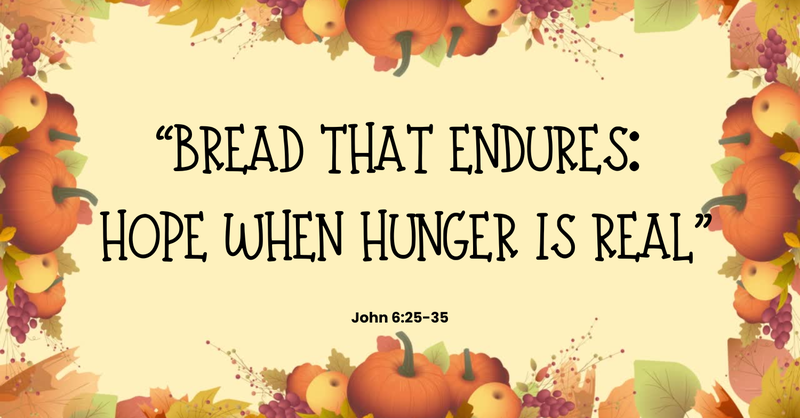
Sermon Summary:
In a world where hunger often means empty stomachs, we are reminded that there’s a deeper hunger inside — a longing for purpose, belonging, hope, and spiritual life. While physical bread feeds our bodies, it doesn’t satisfy the soul’s deepest needs. Jesus offers Himself as the “living bread,” inviting us to seek God’s provision that endures beyond temporal need.
The sermon contrasts earthly provision (temporary, fleeting) with spiritual provision (eternal, sustaining). Believers tend to chase after temporary comforts — security, recognition, material success — yet these often leave an inner emptiness. Christ’s bread — His presence, grace, and truth — fills the void that worldly “bread” cannot touch. Accepting that bread means trusting Him as our true satisfaction, and learning to live from that place of full dependence.
As recipients of this living bread, we’re called not only to receive but to share. Just as Jesus multiplied loaves and fish to feed thousands, we too are invited to feed others — physically, emotionally, spiritually. The church becomes a table of welcome, inclusion, and shared abundance. In doing so we reflect the kingdom where hunger, scarcity, and exclusion are transformed by generosity, justice, and love.
Key Takeaways
- 1. Bodies matter; hunger is real. Jesus’ hard words about “perishing” bread do not spiritualize away empty stomachs; they expose systems that normalize scarcity and call it inevitable. He feeds the five thousand precisely because material need is holy ground. Only after meeting bodies with bread does he question the world that keeps people stuck in survival. The hungry are not the target of his critique—our scarcity-shaped imagination is. [00:46]
- 2. Compassion threatens unjust power. When clergy brought communion and were treated as criminals, it revealed how fragile power is in the face of unqualified dignity. Authoritarians try to starve hope because hope organizes people and unmasks lies. To carry the bread of life is to insist that no one is disposable, and that claim is profoundly disruptive. This is why mercy often meets resistance. [03:33]
- 3. Nourishment is doing the Father’s will. Jesus reframes what feeds us: not accumulation, but alignment with God’s liberating purpose. When we act in compassion, something in us is strengthened that ordinary bread can’t touch. This doesn’t replace food; it expands our understanding of life to include justice, belonging, and courage. We are most alive when love becomes our daily diet. [05:46]
- 4. Practice gratitude as holy defiance. Gratitude isn’t pretending everything is fine; it’s refusing to let cruelty define reality. Giving thanks roots us in God’s abundance, so we can resist rationed narratives of worth and hope. From that rootedness, we can keep showing up with food, care, and presence. Gratitude steadies our hands for the long work of justice. [07:35]
- 5. Become bread that truly endures. Enduring bread looks like solidarity that shows up and keeps showing up. It looks like opening the door when hope knocks—turning compassion into concrete action. As we receive Christ’s life, we become people who nourish others with both provision and presence. This is how hope multiplies in a hungry world. [08:33]
YouTube Chapters
- [00:00] - Welcome
- [00:46] - Wrestling with Jesus’ hard words
- [01:28] - Deprivation used to break spirits
- [03:01] - Clergy bring communion to detainees
- [03:33] - Bread of life as belonging
- [04:13] - Why power resists compassion
- [04:33] - Opening the door to hope
- [05:13] - Jesus feeds real stomachs
- [05:46] - Nourishment redefined as God’s will
- [06:21] - What endures: acts of solidarity
- [06:57] - Choosing hope after despair
- [07:35] - Gratitude as defiance on Thanksgiving
- [07:59] - Christ cannot be rationed or controlled
- [08:33] - Feed bodies and souls together
- [09:11] - Prayer for courage and hunger

